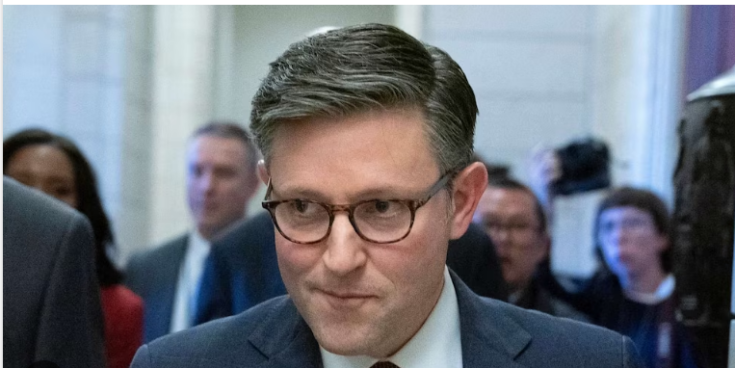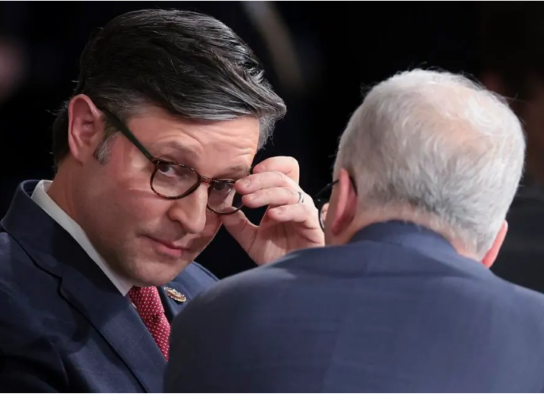- Homepage
- World Affairs
- GOP Senators Discuss Biden’s Proposed Ukraine Aid Package Amidst House Speaker’s Caution
GOP Senators Discuss Biden’s Proposed Ukraine Aid Package Amidst House Speaker’s Caution
Analysis of Potential Funding Alternatives and Legislative Pathways Amidst Concerns and Urgency
The recent discussions among GOP senators regarding President Biden’s proposed Ukraine aid package have shed light on the complex dynamics at play in Congress. House Speaker Mike Johnson’s cautionary remarks have added a new dimension to the debate, prompting considerations of alternative funding mechanisms and legislative pathways. As tensions rise over the urgency of providing assistance to Ukraine, lawmakers grapple with diverging perspectives and priorities.
Johnson’s comments during a question-and-answer session at the Senate Republican retreat underscored the House’s intentions to provide aid to Ukraine while signaling potential deviations from the Senate’s $95 billion foreign aid package. The Speaker hinted at the possibility of structuring the aid as a loan or lend-lease program, reflecting concerns about the fiscal impact on U.S. taxpayers and the need for accountability in resource allocation.
Moreover, Johnson proposed incorporating elements from the REPO for Ukrainians Act, sponsored by Rep. Mike McCaul (R-Texas), which aims to seize Russian assets to fund a Ukraine Support Fund. This approach aligns with the goal of holding Russia accountable for its aggression while providing much-needed support to Ukraine. However, the Speaker’s omission of tough border security reforms, such as the “Remain in Mexico” policy, raises questions about the scope and content of the proposed aid package.

Republican senators, including John Cornyn (R-Texas) and Kevin Cramer (R-N.D.), expressed optimism about the House’s commitment to assisting Ukraine but stressed the importance of a pragmatic approach. Cornyn highlighted the potential benefits of seizing Russian assets and implementing a lend-lease program, drawing parallels to historical precedents such as President Franklin Roosevelt’s initiatives during World War II. Meanwhile, Cramer emphasized the need for bipartisan cooperation to craft a viable solution that addresses the evolving crisis in Ukraine.
The proposal for a lend-lease program has garnered support from lawmakers like Sen. Lindsey Graham (R-S.C.), who view it as a pragmatic and effective means of supporting Ukraine’s defense efforts. Graham emphasized the importance of seizing oligarch assets to prevent further Russian gains on the battlefield, framing it as a just and strategic response to Russian aggression. However, concerns have been raised about the potential financial strain on Ukraine and the logistical challenges of implementing such a program.
Former President Trump’s endorsement of the loan-based approach has added another layer of complexity to the debate, highlighting divisions within the Republican Party over the best course of action. While some senators view loans as a means of promoting fiscal responsibility and accountability, others caution against imposing additional burdens on Ukraine during a critical juncture in the conflict. Sen. Susan Collins (R-Maine) expressed reservations about the loan proposal, citing concerns about its impact on Ukraine’s military capabilities and the urgency of providing immediate assistance.
Despite the differences in opinion, there is a consensus among lawmakers regarding the need for swift action to address the escalating crisis in Ukraine. Senate Republican Leader Mitch McConnell’s call for the House to consider the Senate-passed aid package reflects the sense of urgency and shared commitment to supporting Ukraine’s sovereignty and security. However, Johnson’s insistence on prioritizing regular appropriations bills underscores the competing demands and political considerations facing Congress.

As negotiations between Senate and House lawmakers continue, the path forward remains uncertain. While progress has been made on several appropriations bills, disagreements persist over critical issues such as homeland security funding and border security policies. The looming deadline to avoid a partial government shutdown adds further pressure on lawmakers to find common ground and pass legislation that addresses the immediate needs of the country.
Read More News:
- Bennedict Mathurin Shines as MVP in NBA Rising Stars Game; Delon Wright Set to Join Miami Heat
- Miami-Dade Jail Investigates Inmate Pregnancy Amidst Controversy and Security Concerns
In conclusion, the discussions surrounding President Biden’s proposed Ukraine aid package highlight the complexities and challenges of legislative decision-making in Congress. As lawmakers navigate diverging priorities and policy preferences, the urgency of providing assistance to Ukraine remains paramount. Finding a bipartisan solution that balances fiscal responsibility with strategic objectives is essential to addressing the crisis and upholding America’s commitment to global security and stability.



